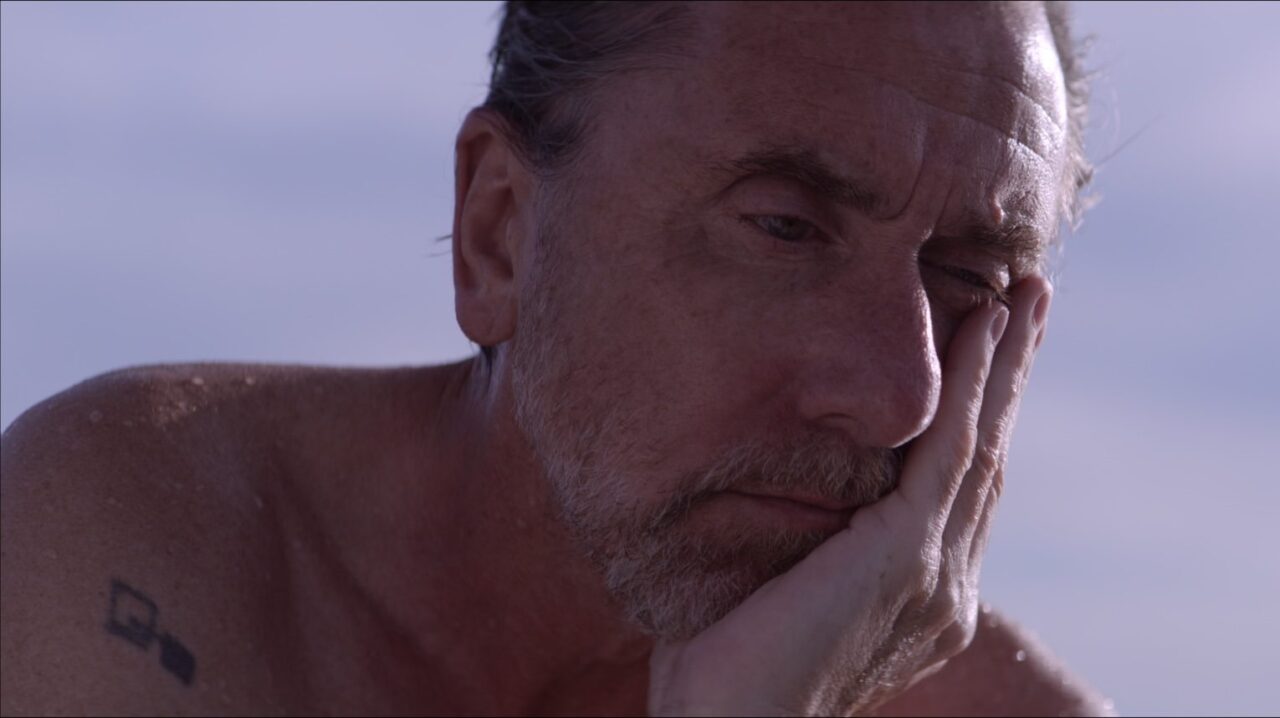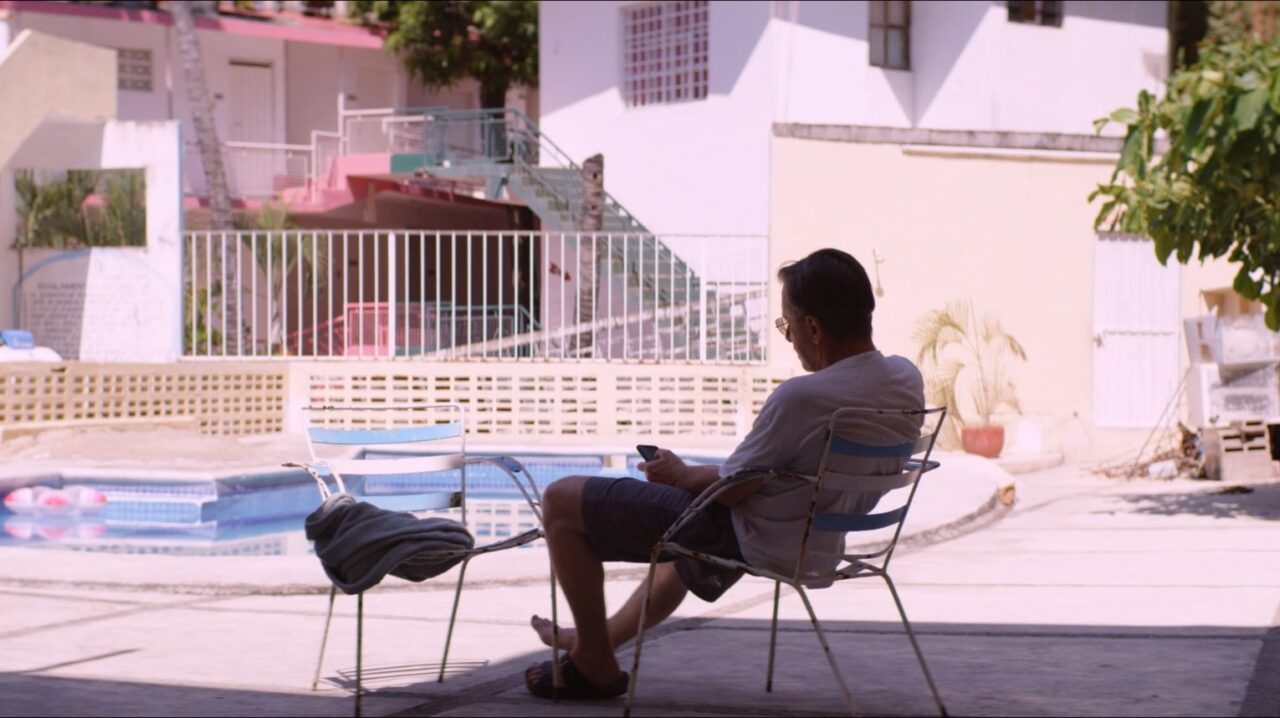In Twist-Filled Drama ‘Sundown,’ Tim Roth Reveals His Shadow Self
This vacation turns south fast.
Where to watch: ‘Sundown’ is now playing in select theaters and available to rent on Digital Platforms.
When it first begins, Sundown slows you down to its wonderfully relaxing, worry-free vacation time. The sight of Tim Roth endlessly lounging in a luxurious resort overlooking a beautiful Mexican coastline had me enjoying every gorgeously serene and sun-drenched moment (and made me remember his other vacation film, 2021’s Bergman Island). Then, Sundown‘s darker story begins to unfold, and the shadows begin to loom large. Soon enough, I also remembered the other side of the fantasy that vacations offer: escaping from your current circumstances, and yourself.
Related: In ‘Bergman Island,’ An Artist Couple Confront Their Love on the Coast
Unless anybody spoils the story for you (don’t worry, I’ll spare you any overly- revelatory details here), you’ll have absolutely no idea what to expect in this twist-filled, thrilling drama. Heading into Sundown as blind as possible really will make for the best viewing experience. Although even I knew a tad more than I would’ve liked to have known before going in, I was still entirely unprepared for what Sundown had in store.
Written and directed by Michel Franco (2020’s New Order), Sundown is a slow-burn film that follows Neil (Tim Roth) on vacation in Mexico with his family, Alice (Charlotte Gainsbourg), Alexa (Albertine Kotting McMillan), and Colin (Samuel Bottomley). When an unexpected emergency summons them all back home to London, the family must cut their trip short and hurry to the airport. It’s a tense moment, made even more heart-dropping when Neil realizes that he’s forgotten his passport back at the hotel. Unable to join them on the flight and now separated from his family, he hops into a taxi. When the driver asks where he’s headed–and it’s here where the film gets interesting– Neil simply requests to be taken to a hotel–any hotel.

Puzzled, we’re left trying to make sense of what’s going on in Neil’s head by studying his calm demeanor and blank, expressionless stares (the film definitely hints that something’s on his mind, with shots of him staring vacantly into the ocean and pools). Neil proceeds to aimlessly walkabout in his flip-flops, having beers on the beach, and even meeting a local, Berenice (Iazua Larios). While Alice continues to try to contact him, Neil continues to deceive and avoid her calls. We’re now fully only along for this mysterious ride, and the Sundown only dials up the heat from there.
Writer-director Michel Franco patiently divulges every piece of new information, which ratchets up the suspense in every scene. Neil’s avoidance really gets under your skin–a cinematic sunburn–when you consider how easy it would be for any one of us to do exactly that. We’ve all had fantasies where we imagine leaving our old lives behind, impulsively staying on that never-ending vacation. Sometimes it’s in the pursuit of enjoying the pleasures that the world has to offer, other times it’s for deeper, more twisted and complex reasons. Like avoiding sinister truths that we can only attempt to outrun for so long.
Franco teases out the rest of Neil’s larger story so well, and especially in regards to how he shoots the film. Yves Cape‘s (2012’s Holy Motors) beautiful cinematography consists of widely framed shots, immersing and hiding Neil in his surroundings. The enduring images in Sundown are of Neil slumped over in various lounge chairs, staring vacantly into large bodies of water (the ocean, a hotel pool, it makes no difference). Also, from behind, in three-quarter, and side-profile shots (there is always a side of him we’re not seeing). Franco uses the idea of the sun and the shadow to further symbolize Neil’s internally conflicted state. Neil stays mostly in the shadows of his hotel room or on the beach, except for a sprinkling of moments where he’s head-on in the scorching sunlight.

Tim Roth is truly exceptional here. As Neil, Roth gives a mostly quiet, internal, and understated performance. The longer Neil remains unwaveringly relaxed under these distressing times, the tension grows to wildly unexpected new heights. We eventually learn about Neil’s history and his family’s global significance as an affluent business, which reveals Neil’s strange behavior. With Sundown, Roth continues to re-emerge onto the film scene as an unsettling, pathological figure (look for him as an unnerving villain in Resurrection, which premiered at Sundance this year). Just by sipping a beer, or even while doing nothing, Roth radiates an unnerving quality who seems to be possessed by the question: what is peace? Is it the sustained feeling of happiness, or can peace just be what’s left when you’ve outrun the darkness?
Related: Sundance: Rebecca Hall Unravels in Psychological Thriller, ‘Resurrection’
If you’re intrigued, and in search of a smartly-written film that starts as a slow-burn drama before ending up as a head-spinning, jaw-dropping hallucinatory fever dream of a film, then look no further than Sundown. Led by an incredible performance by Tim Roth, Sundown is one of the most unexpected, gripping, and utterly arresting dramas I’ve had the joy of seeing recently.
1h 22m. ‘Sundown’ is rated R for sexual content, violence, language, and some graphic nudity.
Ryan Rojas
Ryan is the editorial manager of Cinemacy, which he co-runs with his older sister, Morgan. Ryan is a member of the Hollywood Critics Association. Ryan's favorite films include 2001: A Space Odyssey, The Social Network, and The Master.


